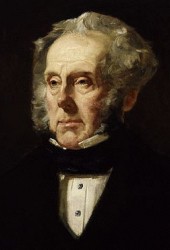Palmerston dominated British foreign policy during the period 1830 to 1865, when Britain was at the height of its imperial power. He held office almost continuously from 1807 until his death in 1865. He began his parliamentary career as a Tory, defected to the Whigs in 1830, and became the first Prime Minister of the newly formed Liberal Party in 1859.
Palmerston succeeded to his father's Irish peerage in 1802. He became a Tory MP in 1807 (his Irish peerage did not bar him from a seat in the House of Commons, because it did not entitle him to a seat in the House of Lords). From 1809 to 1828 he served as Secretary at War, in which post he was responsible for the organisation of the finances of the army. He first attained Cabinet rank in 1827, when George Canning became Prime Minister, but, like other Canningites, he resigned from office one year later.
He served as Foreign Secretary 1830–34, 1835–41, and 1846–51. In this office, Palmerston responded efficaciously to a series of conflicts in Europe. His belligerent actions as Foreign Secretary, some of which were highly controversial, have been considered to be prototypes of the practice of liberal interventionism.
Palmerston became Home Secretary in Aberdeen's coalition government, in 1852, subsequent to the Peelite advocacy of the appointment of Lord John Russell to the office of Foreign Secretary. As Home Secretary, Palmerston enacted various social reforms, although he opposed electoral reform. When public antipathy over the Government's policy in the Crimean War lost the Government popular favour, in 1855, Palmerston was the only Prime Minister who was able to sustain a majority in Parliament. He had two periods in office, 1855–1858 and 1859–1865, before his death at the age of 80 years, a few months after victory in a general election in which he had achieved an increased majority. He remains, to date, the last Prime Minister to die in office.
Palmerston masterfully controlled public opinion by stimulating British nationalism, and, despite the fact that Queen Victoria and most of the political leadership distrusted him, he received and sustained the favour of the press and the populace, from whom he received the affectionate sobriquet 'Pam'. Palmerston's alleged weaknesses included mishandling of personal relations, and continual disagreements with the Queen over the royal role in determining foreign policy.Historians consider Palmerston to be one of the greatest foreign secretaries, as a consequence of his handling of great crises, his commitment to the balance of power, which provided Britain with decisive agency in many conflicts, his analytic skills, and his commitment to British interests. His policies in relation to India, Italy, Belgium and Spain had extensive long-lasting beneficial consequences for Britain: although the consequences of his policies toward France, the Ottoman Empire, and the United States were more ephemeral.
